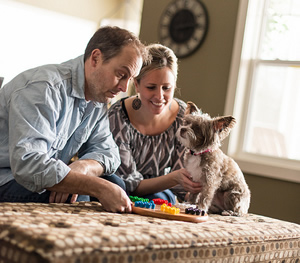Meeting of the Minds

A story of two brothers and how a room full of doctors gave them a second chance
If you're a patient at the University of Michigan Rogel Cancer Center, you may have heard your oncologist mention a meeting where experts gather to talk about your situation and share ideas on the best way to treat you. It's called a tumor board and, though it's standard practice at U-M to have a board for virtually every kind of cancer, few hospitals in the United States have that level of subspecialty cancer expertise.
One of the biggest benefits of being treated at an academic medical center like U-M is the level of knowledge in so many aspects of cancer and cancer care. The Rogel Cancer Center has specialists in every tumor type who work only with that particular type of cancer. Part of their job is to meet regularly, review test results, share ideas and come up with innovative ways to save lives.
When other hospitals run out of treatment options, experts in the U-M tumor boards are searching for solutions. Here is just one example of how a tumor board reached beyond "standard care" to offer hope to two brothers.
A Family History of Lung Disease
Meet the Bowser brothers, Aron and Cory. At 46 years old, both had pulmonary fibrosis, a lung disease that left them short of breath and, for Aron, in need of oxygen for even the simplest daily tasks. Lung disease is common in their family. Their mother passed away in 2004 and their brother (they are triplets) died in 2009.
Cory Bowser developed lung cancer and went through treatment to successfully remove it. However, his pulmonary fibrosis worsened, leaving him in a dire health situation. Meanwhile, his brother Aron developed cancer in both lungs. Both received treatment at the University of Michigan and, because of the difficulty of their cases, the thoracic tumor board partnered with the Bowsers' pulmonary doctor to discuss what options, if any, were available.
Multidisciplinary Thoracic Oncology Conference (the official name of the Tumor Board)
Every patient's situation is different, which means the specialists who attend the tumor board vary depending on the circumstances of a person’s cancer. Because Cory Bowser had pulmonary fibrosis and had also been treated for cancer, his pulmonologist, Fernando Martinez, M.D., was in attendance. General thoracic surgeons, who care for lung cancer and lung transplant patients, as well as a host of other clinicians who had expertise to lend to the discussion, also participated.
For Cory's oncologist, Greg Kalemkerian, M.D, the case was unique in that a transplant was considered. Cory needed a pair of healthy lungs, but patients treated for cancer usually are not considered eligible for organs. Without new lungs, Cory could die.
After collaborating, Kalemkerian, Martinez and the thoracic surgery team believed Cory was a candidate for transplant. He had no evidence of cancer at the time and, with a new pair of lungs, cancer was unlikely to come back. The tumor board weighed the options and discussed alternatives. Last fall, Cory received a new pair of lungs in an operation performed by U-M thoracic surgeon Andrew Chang, M.D.
Another Brother in Distress
As Cory Bowser recovered from surgery, his brother Aron had a separate set of challenges. The difference between Aron and his brother was that Aron had active cancer in both lungs. His chances of getting approved for a transplant were slim. The tumor board met again with Cory's successful lung transplant fresh in their minds.
Aron's lungs were not functioning well enough to withstand radiation therapy or surgery to remove the cancer. Lung transplantation for a patient with active cancer remains well beyond standard-of-care and took a thorough analysis of pros and cons by the experts in the tumor board meeting. Kalemkerian worked to demonstrate that Aron’s cancer was contained to the lungs. Martinez believed a transplant would solve his pulmonary fibrosis.
Last Dec. 23, Aron Bowser, like his brother Cory, received a double lung transplant by Chang. Essentially, his fibrosis and cancer were resolved at the same time.

Looking Ahead
Aron Bowser, married with three kids, says he’s already feeling at least 70 percent back to normal after his transplant. He is hoping to continue to improve enough to return to work as a police detective.
"Sometimes I'm amazed I can take a deep breath," Aron says. “I can take a shower without having to sit down or being out of breath. Now I can yawn when I'm tired. Before, I'd have to swallow it."
Prior to his transplant, Aron was on oxygen 24/7. He was mostly confined to home.
"I'm hoping the transplant solved the problem and that I can get back to normal life," he says. "Back to my normal job and saving for retirement. If we hadn't received the transplant, Cory and I would have barely lasted another month."
Kalemkerian says, for the Bowser brothers, so far so good. In his 25 years of caring for people with lung cancer, it was his first time being involved in decisions regarding lung transplantation.
"Without having experts with different experiences and fields of expertise sitting in the same room, looking at all the data, asking questions of each other and having a free and nonjudgmental discussion, neither of the Bowsers would have undergone lung transplantation," Kalemkerian says. "Both would be getting palliative chemotherapy for incurable, advanced stage lung cancer and would be debilitated by severe pulmonary fibrosis."
Continue reading the Spring, 2014 issue of Thrive.
Learn more about tumor boards and multidisciplinary teams
Understand how the National Cancer Institute defines a tumor board
